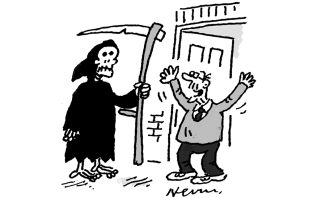‘A working class hero is something to be.’ Rishi Sunak and Keir Starmer must have missed the conflicted, sardonic edge to John Lennon’s lyric, from his 1970 song ‘Working Class Hero’, given their rush to scrub away the whiff of privilege in the crudest manner imaginable. Sunak, desperately, by means of bemoaning a childhood forever blighted by lack of access to satellite TV; Starmer by dully hammering home that he is the son of a toolmaker.
A country pile, a double-barrelled girlfriend and a mock-regal drawl were valued plunder in 1960s pop
As in politics, so in music. In both fields, class anxiety has become inverted. The fear now is to appear too privileged. It wasn’t always thus. Think of Mick Jagger in the late 1960s, dangling a cigarette over an elegantly draped wrist and talking like a louche, disinherited duke. Back then, rock and rollers aspired to the aristocratic. A country pile, a double-barrelled girlfriend and a mock-regal drawl were all valued plunder.
Nowadays, the aristos have taken over and would rather keep quiet about it. Pop stars are getting posher and, like our politicians, they don’t know how to talk about the many benefits such rare luck offers – among them first-class music tuition, instant industry connections and the luxury of time (meaning money) to pursue their dreams. As for the pitfalls, the ultimate nightmare is to appear as disconnected from reality as Sunak. This year’s excellent BBC Sound of 2024 winners, the Last Dinner Party, were recently forced to issue a statement after the Times ran an article in which lead singer Abigail Morris was quoted – misleadingly, it transpired – as saying that ‘people don’t want to listen to post-punk and hear about the cost-of-living crisis’.
Morris was educated at Bedales. Others in the band are similarly well schooled. The sound of privilege preaching airy indifference in the age of austerity didn’t land well. A PR crisis was narrowly averted via a statement in which the group talked about the ‘brutality’ of the current political climate and our state of ‘national emergency’. They went on: ‘The privilege we have (personally and as a result of being signed to a major label) has not been lost on us.’
If Sunak were a far smarter politician, it’s a line he could have borrowed with only minimal variation.
To add to the heady scent of posh panic, the Last Dinner Party added: ‘It is becoming impossible for artists from working class and other marginalised backgrounds to be heard.’ This is especially true at the top end of the UK pop scene, where privilege abounds. Of this year’s Brit award nominees, Charli XCX went to Bishop’s Stortford College, Jessie Ware attended Alleyn’s and Dua Lipa studied at Sylvia Young’s Theatre School. These days, Posh Spice would require a different nickname.
The 2023 Brit winner Fred Again, aka Frederick Gibson, is an alumnus of Marlborough College, where the Princess of Wales also studied. The son of a KC, Gibson was 16 when a family friend invited him to join a neighbour’s a cappella group. The neighbour was Brian Eno. Annie Lennox popped in. His success has been stratospheric but the backlash brutal. The Face called him ‘the perfect victim for a shot of 21st-century authentocracy’.

Knowing of an artist’s well-heeled background can encourage confirmation bias. Fred Again’s bland electronic output feels even more coldly calculated; musical PPI. Likewise, Coldplay have – unfairly – become a byword for dull careerism partly because of their aura as nice, privately educated chaps (which Chris Martin is, although not all of the others). James Blunt has never been cool, but his fate, critically speaking, was sealed once he opened his mouth and a cut-glass upper-class accent fell out. Born James Hillier Blount, the son of a colonel, Blunt went to Harrow. He has, winningly, used humour to combat ridicule, but had he been born under a different sign you wonder if there might have been quite so much of it.
So, where can the poor posh folk sing freely? Prog rock has proved a happy hunting ground – Genesis were boarding-school boys and not ashamed to admit it – while punk, rock and indie have traditionally operated on a case-by-case basis.
I recall much class-traitor consternation in the music weeklies when it turned out that Norman Cook – the bass player in staunchly socialist, Hull-based 1980s band the Housemartins, and later the wildly successful DJ Fatboy Slim – was actually called Quentin and had attended Reigate Grammar (where he was a contemporary of Starmer).
Then again, the fact that Joe Strummer and Shane MacGowan both attended fee-paying schools only seemed to shore up their iconoclastic credentials. Both understood that you can’t hide where you
come from and that, in music as in politics, it’s the direction of travel that counts. For any artist, of any bearing, the old aristocratic mantra would seem a sound one: never apologise, never explain.








Comments